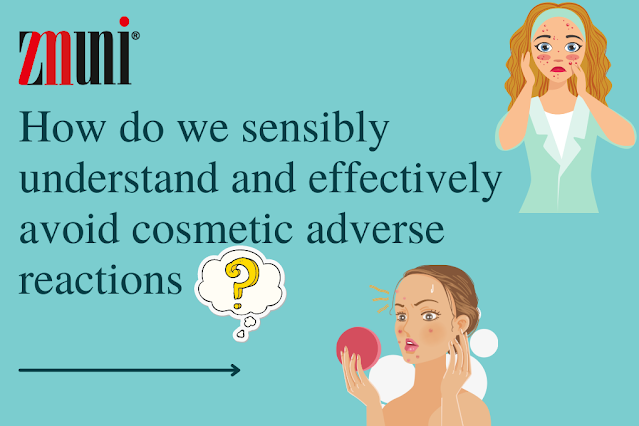In our daily life cosmetics make us more beautiful. However after using cosmetics some consumers have the symptoms of skin itch, skin erythema, those are the most common cosmetic adverse reactions. How do we sensibly understand and effectively avoid cosmetic adverse reactions? ZMUni collected a Q&A article on cosmetic adverse reactions from NMPA website, and we translated it, please see the paragraphs below.
Q: Why does cosmetic adverse reaction occur?
A: There are many causes of cosmetic adverse reactions: the cosmetics used by some of the consumers are illegal products, expired products or products not stored according to storage conditions. Eg. The use of cosmetics in which hormones or antibiotics are illegally added. Though some of the consumers use legal cosmetics, they are allergic to certain ingredients in the cosmetics used and it causes cosmetic adverse reactions such as allergy. Besides, some other consumers don’t carefully read the instructions on the labels before use so that they don’t use the cosmetics in the right way. Eg. They don’t have allergy warning test before using the hair dye products, then allergy symptoms are caused after dyeing the hair.
Q: What are the specific symptoms of cosmetic adverse reactions?
A: There are various symptoms of cosmetic adverse reactions, and the most common ones are skin itching, burning and tension, if the condition is serious it may cause skin erythema, pimples. Some cosmetics may cause abnormal skin pigment, hair loss, lip inflammation, finger / toenail deformity, and cause or aggravate acne, etc.
Q: How to reduce cosmetic adverse reactions?
A: Firstly, select cosmetics from legal source. If using cosmetics in beauty salon it’s also important to ask for the product source, check product labels and instructions carefully, ask to see the product purchase certification if necessary. When purchasing products, pay attention to asking for invoices and shopping vouchers for rights protection.
Secondly, pay attention to check whether the contents on the label are clear, the packaging is good. The product name, all ingredients mark, manufacturer name and address, directions for use, production date and shelf life, storage conditions and necessary safety warnings on the label shall be marked clearly. There should be Chinese labels on imported cosmetics. Consumers shall hold reasonable expectations on cosmetic efficacies, and be more cautious about the cosmetics that express or imply they have medical effects, contain misleading contents or contents exaggerating the efficacies, and avoid using them.
Thirdly, reasonably use cosmetics according to the direction for use as stipulated in cosmetics mark. If cosmetic adverse reactions occur, the use shall be stopped immediately and If necessary, go to the dermatology department of the hospital in time. Bring the recently used cosmetics and their packaging while going to the hospital so as to help the doctor to identify if the symptoms are related to the use of the cosmetics.
Q: What should special groups such as people with allergies, pregnant women pay attention to when using cosmetics?
A: People with allergies (such as asthma, allergic rhinitis, etc.) and patients with allergic skin diseases (eczema, atopic dermatitis, urticaria, etc.) should have skin tests before using cosmetics. If consumers are aware of their own allergens, they can identify whether the product contains ingredients that are allergic to them by looking at all the ingredients marked on the cosmetic label, and avoid using products that may cause allergies to the greatest extent.
Pregnant women, as one of the special groups, when choosing cosmetics, they shall not only consider the impact of cosmetics on themselves, but the health of the fetus. Therefore, it is necessary to try to use cosmetics with simple ingredients and reduce unnecessary cosmetics, such as: hair dye, perm, freckle removal, perfume, lipstick, etc.
Q: How should consumers report cosmetic adverse reactions?
A: Consumers can contact the cosmetics brand to inform them of the suspected adverse reactions after using a certain product. If consumers go to a medical institution which functions as a monitoring and evaluation base for cosmetic adverse reactions or a monitoring post, they can report adverse reactions through the medical institution. Consumers can also report adverse reactions that may be related to the use of cosmetics to the local cosmetic adverse reaction monitoring(CARM) institution or the Medical Products Administration.
Q: In order to avoid cosmetic adverse reactions, should we reduce the use of cosmetics?
A: The use of cosmetics has become a part of people's daily lives, and objectively speaking, most of the cosmetics on the market are safe. In the population of cosmetic adverse reactions, most of the damage caused by adverse reactions is mild, and after stopping the use of cosmetics that caused adverse reactions, the symptoms of most consumers can heal themselves. Therefore, consumers should not only improve their awareness of makeup safe use , but also be confident in safe use of makeup.
————————————






0 Comments